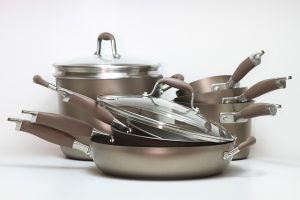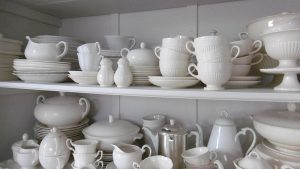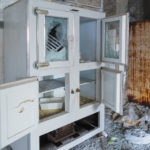The kitchen is a significant part of every home. Whether it’s where families and friends gather to dine, cook, or simply hang out, a kitchen best suits the needs of everyone when it’s organized. In order to systematize this invaluable space, the kitchen must be decluttered of all inessential items.
Organizing the Kitchen

Purge your kitchen of extra items and make room for structured storage compartments for a neat, clean, and decluttered kitchen. You’ll discover that your forks don’t need to lay with the cooking ladles. Plus, that unopened jar of spaghetti sauce—unless you’re adept with tomato sauce and spices and make your own—should sit reliably in the pantry. The next time you prepare dinner for friends at 5:00 pm and you struggle to find eating utensils by 4:59 pm, you’ll know it’s time to declutter the kitchen.
Organizing an unorganized space, filled with gadgets in every corner, rusty appliances, or stuffed with foodstuffs of incredible variety, can be a daunting task. Start simply. You’ll soon be amazed at your progress, and your kitchen will be a safe haven in which all can cook with ease, snack, and gather without being overwhelmed!
Organizing Kitchen Appliances
Tackle your large appliances and electronic gadgets, like can openers or automatic fruit slicers, first. Test out which appliances and gadgets fully function. Rusty mixers or hand-held gadgets that don’t work should be tossed or repaired. If you choose the repair route and find you have little need for them, donate these surplus items. The gadgets will be useful in someone else’s kitchen!
You may even want to consider donating your waffle iron that’s been sitting idly in the cupboard for months and taking up valuable space that could be useful to house electronics you use daily if not weekly. You can still make a Sunday brunch of fresh waffles—just borrow one from a friend when you have the impulse!
Compartmentalize Utensils

All the forks, spoons, and butter knives utilized at meal time should ideally have their own designated space. You’ll easily spot them when they have their own compartments in a drawer, rather than fishing for them through a mess of ladles and a mix of gadgets.
Organize Cookware
Examine your pots and pans for rust, breakage, or worn Teflon. Throw these dysfunctional cookware items into the recycling bin, unless you plan to polish or repair them soon.
An additional helpful tip is to downsize your cookware. Experts suggest to only keep the pots and pans in three or four varying sizes that you use frequently, such as on a weekly basis. As far as baking tins, like cupcake pans, keep only the ones you’ve used in the past six months.
Eliminate Duplicate Kitchen Items
That nice cheese grater on sale looks awfully useful; but did you check that corner way in the back of your cupboard? You just may find you’ve already got a cheese grater stuffed away, concealed from your everyday glances into the cabinets when you cook.
Look for items you already own, and discard duplicates. Decluttering makes this process easier, since you can start to see if you’ve amassed scores of the same items.

Multi-task Cookware
You can interchange your cookware: a salad bowl or fruit bowl can serve as a mixing bowl. Keep in mind that bigger pans offer more versatility. Experts also say common gadgets can perform multiple functions. Get rid of the hand whisk when your hand mixer works perfectly well. The excess plastic containers in your cabinets can be recycled, particularly if the cooking pans in your kitchen are safe for both the fridge and oven.
Toss Extra Tableware
The cups and saucers you use daily should be stored in the kitchen. The rest, like the 45 wine glasses you bought for the parties you throw every few years, should be kept in storage, like in a closet, in another part of your home. Or, better yet, simply ask friends to bring extra wine glasses if you host a party only once in a while.

Additional items to toss include the holiday plates you never use during the holidays—or at any other time of year. Cracked and chipped dishware are unsafe to eat from, so it’s best to discard these. Plastic ware that hasn’t been touched in months should also find their way to the garbage. Any bent knives have no utility, so send them to the recycling bin. Plus, all those containers without a matching lid should also be tossed.
Apply the Six-Month Rule When Decluttering the Kitchen
When it comes to the items in your kitchen, from the appliances on your countertop to the spices in your pantry, discard anything that you haven’t used in the last six months.
Decluttering takes time, but the clean, tidy results are well worth the effort. If you’ve got a mountainous mess that is difficult to clean, you can contact a hoarding cleanup service to get the job done. ServiceMaster by Restoration Century is one such trusted name in the hoarding cleanup business. Serving the central and south Texas communities, ServiceMaster by Restoration Century works with homeowners and their families to help determine which items stay and which ones should be discarded. The skilled team at ServiceMaster by Restoration Century compassionately works with those who compulsively hoard items to reach an agreeable and safe solution.
Hoarding is no small issue. The results of obsessive hoarding have dangerous consequences, including impacting safety. A clutter of

objects can be a fire hazard. Accumulations of items can block fire exits, as well. Multiple objects stored on high shelves can fall and injure people and pets. Hoarding can also spur the growth of bacteria and mold, making residing within a home extremely unsanitary. Rest assured that ServiceMaster by Restoration Century is aware of the seriousness of hoarding and is committed to working with families to carefully remove the unnecessary items that contribute to the danger within the property. Contact ServiceMaster by Restoration Century when cleanup of your home is required to make your space safely habitable once again.




